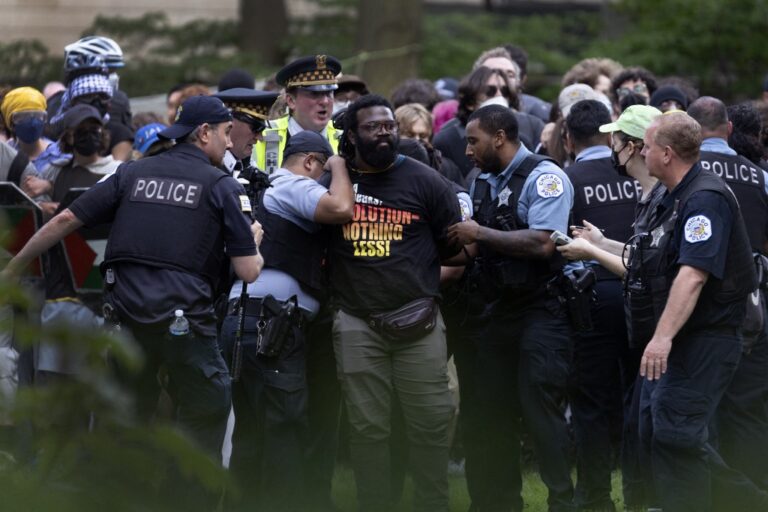
If you’re studying in the US, you’re most likely a F-1 visa holder.
If you’re studying in the US, you’ve most likely witnessed the many causes championed by people, students and professors on your campus and beyond, such as the student protests.
Apart from being home to some of the world’s best colleges and universities, the US is also known for their active advocacy groups that support powerful causes ranging from civil rights to public health to political activism. It’s “The Land of the Free,” as they say.
Among the earlier social movements in the 60s and 70s included feminism, the civil rights movement, and LGBTQ+ rights. These significant events still continue to shape American politics and culture today with an increasing number of advocacy groups speaking up against social and political issues.
What’s more, the First Amendment of the US Constitution protects demonstration, peaceful protest, and freedom of expression of one’s beliefs.
While international students are protected by the amendment, there are certain restrictions you have to abide by, as your presence in the country relies on having an F-1 visa.
As of May 2024, students, alumni and faculty at more than 130 colleges and universities across the US (and many other countries) are protesting against the war in Gaza, bringing light to the complicity of these universities in Israel’s continued occupation.
While the demonstrations have yet to reach the scale of other US student protests (like the Vietnam War in the late 1960s and the South African apartheid in the 1980s), Professor Robert Cohen of New York University says that it is becoming one of the largest student movements of the 21st century.
Students have set up encampments and protests, and law enforcement has intervened. Attacks have taken place, and according to the Associated Press, more than 2,000 have been arrested.
“Gaza is why we’re here. Gaza is why we’re doing this,” a student at The New School in New York City told Al Jazeera. “The encampment is happening because we want to make sure that we are doing what we can to end this genocide.”
The Washington Post reports that international students who engage in the protests face even higher stakes — suspension or expulsion means that you “can no longer maintain a full course of study,” or if you’re found “committing a crime warranting removal from the US,” it’ll lead to the termination of your F-1 visa and your right to lawfully remain the in the US.
If you’re passionate about participating in organised student protests, you are free to do so, but proceed with caution.
As a rule of thumb, don’t resist law enforcement. In these situations, you are trying to reduce the risk to yourself. The best thing to do is to comply, even if you think you are being violated.
You have the right to remain silent and not discuss your citizenship or immigration status with the police, immigration agents, or other officials.

Members of the Washington Metropolitan Police Department gather as Pro-Palestinian demonstrators rally on the campus of George Washington University on May 9, 2024. Source: Kent Nishimura / Getty Images via AFP
Here’s what you need to know about student protests as a F-1 visa holder:
If you are stopped by law enforcement:
Stay calm and don’t resist or do anything that will obstruct the officer, even if you believe your rights are being violated. Keep your hands where the police can see them, and don’t lie about your status or provide false documents.
Some of your rights F-1 visa holder include:
- Remaining silent. You are not obligated to discuss your immigration or citizenship status with police, immigration agents, or other officials. Anything you tell an officer can later be used against you in immigration court.
- If you are not a US citizen and an immigration agent requests your immigration papers, you must show them if you have them with you.
- You have the right to say no if an immigration agent asks if they can search you. Agents do not have the right to search you or your belongings without your consent or probable cause.
- If you’re over 18, carry your papers with you at all times. If you don’t have them, tell the officer that you want to remain silent or that you want to consult a lawyer before answering any questions.

Pro-Palestinian students and others gather outside of Baruch College in Manhattan to protest the school’s stance on Israel on May 9, 2024, in New York City. Source: Spencer Platt / Getty Images via AFP
If you’ve been stopped by the police or ICE (Immigration and Customs Enforcement):
Again, whatever happens, remain as calm as possible and do not lie or give false documents.
Some of your rights as a F-1 visa holder include:
- Remaining silent. In some states, you may be required to provide your name if asked to identify yourself.
- Refuse a search of yourself or your belongings, but do note that the police may pat down your clothing if you’re suspected of carrying a weapon.
- You have the right to a government-appointed lawyer if you’re arrested by the police.
- If you are detained by ICE, you have the right to consult with a lawyer, but the government is not required to provide one for you. You can ask for a list of free or low-cost alternatives. You also do not have to answer questions about where you were born, whether you are a US citizen, or how you entered the country.
In the case you are arrested or detained, say you wish to remain silent and ask for a lawyer immediately. It is in your right to make a local phone call.
As for non-citizens, don’t discuss your immigration status with anyone but your lawyer. You may also ask your lawyer about the effect of a criminal conviction or plea on your immigration status.
While you are in jail, an immigration agent may visit you. Do not answer questions or sign anything before talking to a lawyer. Read all papers fully. If you do not understand or cannot read the papers, tell the officer you need an interpreter.
For more details, read up on your rights here.
Disclaimer: This article was last updated on May 10, 2024.










